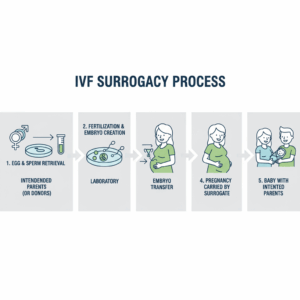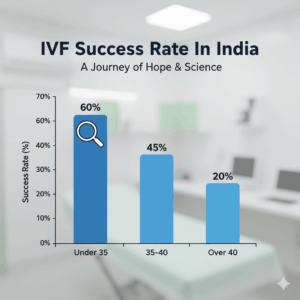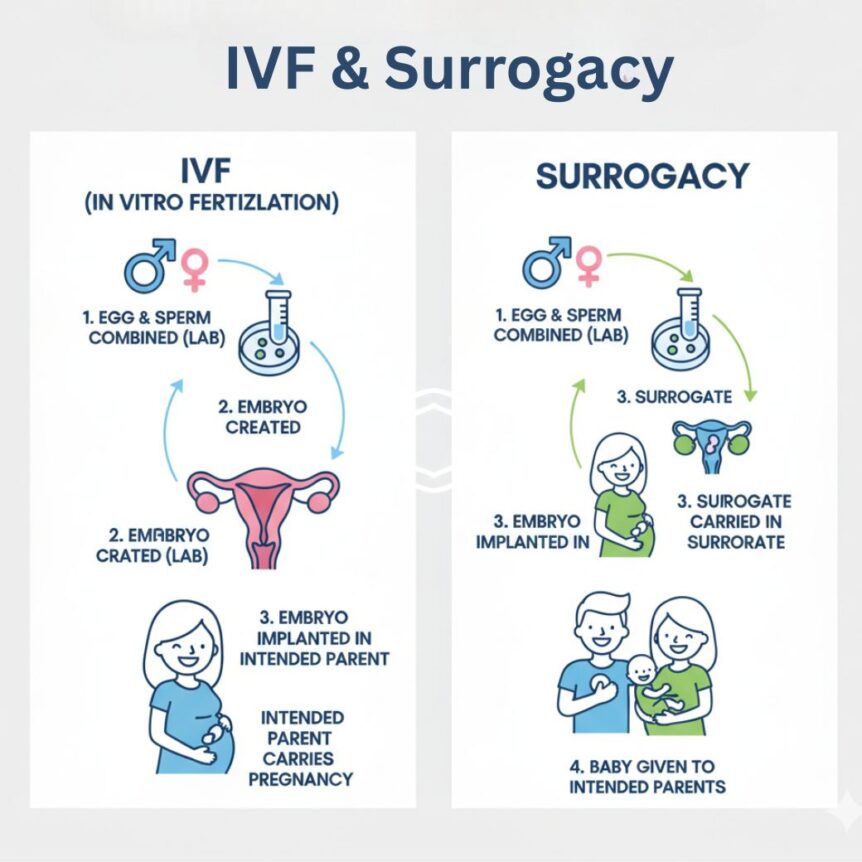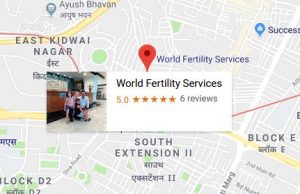The wish to start a new journey with a baby in your lap isn’t less than a boon to an infertile couple in the World. Therefore, we have brought the comparison between IVF & surrogacy treatment based on different patient requirements or preferences. It often brings huge joy, and hopeful dreams with the best fertility solution at the renowned IVF clinic in your home town or other developed country.
But, for some, the path to biological conception isn’t always easy or clear to all needy infertile couples. Fertility treatment can lead to unexpected challenges, and emotional twists to conceive a baby through a particular fertility remedy at a lower cost by choosing the best IVF clinic in the world.
Although, luckily, medical science offers powerful options, for instance, In Vitro Fertilization treatment or surrogacy to birth a baby through a surrogate mother. They have helped countless overcome infertility or other big hurdles to having a healthy child. These methods open new doors to parenthood.
This content or its components will take a deep dive into IVF and surrogacy treatment. We will explore how each process works, what you need to think about, and what you can expect on your journey. Understanding these paths can make your family dreams real.
Understanding In Vitro Fertilization In The World
What Are IVF & Its Benefits?
Notably, the IVF stands for In Vitro Fertilization treatment that offers comprehensive medical services in which people have the option to get a successful pregnancy under the vision of high-efficiency doctors or laboratory processes. In this treatment, doctors collect the healthy eggs or sperm from intended parents, and combine into the laboratory dish to create healthy embryos.
Afterward the completion of the laboratory process, IVF specialist will collect the mature embryo, and enter into her uterus to develop a baby under the natural 9 months period of pregnancy. This is where the name IVF called In Vitro Fertilization from meaning in glass. That whole process comes under the assisted reproductive technology act to follow the restrictions during IVF treatment.
The IVF Process – Step-By-Step
To regulate the stages of IVF treatment, we should take a tour to recognize the IVF process step-by-step in the following sentences, or manage the aspects to not overlap, especially in strict countries, for instance, India for a precise journey under IVF specialists or a good consultation through experts.
- Ovarian Stimulation: Initial stage of IVF treatment takes hormone injections for about 8 to 14 days. These medicines encourage her ovaries to produce many healthy or mature eggs , not just one or twistedly. As of the initial process, IVF doctors watch this stage closely to not miss out the correct time to collect them.
- Egg Retrieval: Egg retrieval in which once eggs are ready, a minor surgical procedure collects millions of eggs from the uterus. In this way, a doctor uses a thin needle, guided by ultrasound, to gently remove the eggs from the ovaries of an intended mother. The process will complete between 10 to 20 minutes with high-efficiency equipment to reduce the risks.
- Fertilization: In the fertilization process, doctors will keep the eggs or sperm from the intended father in the lab. Fertilization can happen naturally or through a method = called ICSI, where a single is injected into the fertilized egg in the lab to create a healthy embryo.
- Embryo Culture: Embryo culture means, the fertilized eggs or sperms will take 5 to 8 days to grow in a special incubator for a few days. IVF specialists will watch the embryo process from time to time with each minimal change that indicates collaboration to a successful pregnancy.
- Embryo Transfer: Now, it’s time to transfer the developed embryo into her uterus to conceive a baby through IVF treatment. This step is often like a regular pelvic exam, and usually does not need anesthesia for anything in the embryo transfer.
- Pregnancy Test: Pregnancy test likely comes between 9 to 14 days after the embryo transfer, a blood test assists to monitor the pregnancy status. This test measures a hormone that only appears when pregnancy occurs. It’s a moment of truth for many.
Who Is A Good Candidate For In Vitro Fertilization Treatment In The World? – IVF Surrogacy Process

IVF Surrogacy Process
However, IVF treatment offers a relevant solution for many different challenges in getting pregnant. It is often treatments that have not worked due to lack of inability in the reproductive cycle. In contrast, are you wondering if IVF could be right for you with sufficient aspects that assist to enhance the chances of pregnancy initially?
In Vitro Fertilization treatment assists infertile couples, and individuals facing several issues during IVF. For instance, if an IVF doctor cannot question a clear reason or factor why someone cannot get pregnant is called an unexpected infertility case marked. Furthermore, the IVF can also assist if the fallopian tubes are damaged or blocked due to certain reproductive reasons, and it takes emphasis to deliver the eggs from ovaries. Problems with ovulation, where eggs are not released regularly, are another common reason.
In the different vision, a woman with endometriosis, a condition where tissue similar to the uterine lining grows outside the body, may also indicate IVF treatment at the best IVF center in India. Let’s beacon on the male infertility.
Low sperm count or poor sperm movement can make natural conception difficult, IVF combined with ICSI can overcome this. If there’s a risk of passing on a genetic disorder, IVF allows for genetic testing (PGT) of embryos before transfer. Lastly, IVF makes single parenthood and family-building for same-sex couples possible, often with the help of donor eggs or sperm.
Success Rates & Factors To Consider In The World – IVF Success Rate In India

IVF Success Rate In India
Here, we have disclosed the IVF success rates can vary quite a bit for an IVF treatment. It contains several factors that must be considered as a high success rate clinic for their infertility treatment. In this section of the content, the success rate brings the right age of the woman using her own eggs during IVF option.
On the other hand, clinics reputation, treatment costs, staff management, previous success stories, and location also does matter whenever an infertile couple go for IVF vision in India or another providing country.
Apart from this, intended mother eggs or father sperm also plays a significant role to enhance the success rate whether the case is new or older for IVF doctors. For better outcomes, you have to remove the bad habits, for example, smoking, alcohol, and other non-required substances to decrease the fertility ratio that has remained in the reproductive system.
|
Clinic Name |
Key Achievements / Experience |
Reported IVF Success Rate |
|
World Fertility Services |
Over 20,000 couples treated; 40+ years of IVF expertise; global patient base |
53% to 65% |
|
Go IVF Surrogacy |
10+ years experience; 10,000+ live births; broad international surrogacy and IVF offerings |
53% to 65% |
|
Select IVF |
Offers a wide range of treatments (ICSI, FET, donor programs); transparent statistics shared |
Own eggs: ~50–60% Donor eggs: ~70–77% |
|
Birla IVF Clinic |
Large national network; personalised fertility plans; age-based success transparency |
Under 35 yrs: ~50–60% Above 40 yrs: <10% |
|
Baby Joy Clinic |
15,000+ successful births; high first-attempt success rates; known for affordability |
79% success rate (claimed) |
|
Indira IVF Clinic |
One of India’s largest IVF networks; over 1.5 lakh successful pregnancies across 100+ centers |
74%+ claimed average success |
|
Fertility Center Nepal |
Serving local and international patients; caters to various age groups; cost-effective treatments |
Age 30–35: ~50% Age 35–40: ~30% Some ~75% cases |
Let’s Understanding The Surrogacy Treatment In The World – Gestational Surrogacy In India

Surrogacy Treatment In World
What Is Surrogacy?
Adduce surrogacy in the front of every seeker across the enthusiastic countries or its territories. Surrogacy is divided into two parts or types, for instance, Gestational or Traditional surrogacy as per law or regulation allowance in certain countries that offer the surrogacy treatment to their exciting patients.
The whole treatment pillar stands with a third person assistance which is called a surrogate mother, who conceives a baby for intended parents. Under the surrogacy act, a surrogate mother has to pass out certain tests to become a surrogate mother for needy intended parents. In the aforementioned section or short paragraph, we have explained the difference between traditional or gestational surrogacy with a suitable example to deem deeply.
Type Of Surrogacy In Selected Countries In The World
There are two major surrogacy types that are proven to deliver a baby to intended parent hands through a surrogate mother. Let’s determine these types of surrogacy like IVF & surrogacy, and which one is important for intended parents.
Traditional Surrogacy In The World
Traditional surrogacy means a surrogate compensation provision through intended parents. In this order method, a surrogate mother uses her own eggs to birth a baby in her womb for intended parents, and couples. In which intended father sperm is the same, but the egg will change with a surrogate one.
It means, she also has rights on the child after birth if intended parents don’t have to process or follow the surrogacy law in any country where they are doing the treatment. In contrast, this type of surrogacy remained in a few amounts in the world or its countries. The United States Of America, Portugal, Canada, The U.K, Australia, and Netherlands where an infertile couple can get a petition for traditional surrogacy with their bad circumstances.
Gestational Surrogacy In India
Gestational surrogacy is totally different from the traditional ones, in this type of surrogacy, a surrogate mother doesn’t have any genetic relation with a new child as a third non-official mother just to carry him.
This is the most common type of surrogacy now in the world. This kind of surrogacy which combines with IVF treatment means, IVF doctor collects the eggs or sperm from Intended parents or fertilized in the laboratory, after this process, the created embryo will transfer into a surrogate ovary. The gestational surrogate has no genetic link to the baby even, she carries the baby in her womb as we have disclosed in the upper case of content or its components.
|
Actions In Treatments |
Traditional Surrogacy |
Gestational Surrogacy |
|
Definition |
The surrogate uses her own egg and is the biological mother of the child. |
The surrogate carries a child conceived with the intended parent’s or donor’s egg and sperm (no biological link). |
|
Biological Link |
A surrogate is the genetic mother of the child. |
The surrogate has no genetic relation to the child. |
|
Conception Method |
Usually via IUI (intrauterine insemination) using sperm from the intended father or donor. |
Done through IVF, using embryos created from intended parents or donors. |
|
Legal Complexity |
More complex – the surrogate has parental rights in many regions. |
Less legally complex – surrogate has no genetic claim to the child. |
|
Parental Rights |
A surrogate may have to legally terminate her rights post-birth. |
Intended parents are usually listed on the birth certificate directly. |
|
Popularity |
Rarely used today due to legal/emotional complications. |
The most common surrogacy method used worldwide today. |
|
Emotional Factors |
Higher emotional risk – surrogate may feel deeper attachment to the child. |
Lower emotional attachment due to no genetic connection. |
|
Medical Involvement |
Less invasive – surrogate doesn’t need IVF, only insemination. |
More medically intensive – surrogate undergoes IVF and embryo transfer. |
|
Cost |
Lower cost – no IVF required (generally). |
Higher cost – includes IVF, embryo creation, medical protocols. |
|
Availability |
Restricted or banned in many countries due to legal complexity. |
Widely available in countries/states with legal frameworks for surrogacy. |
|
Risk of Custody Disputes |
Higher risk – surrogate is the biological mother and may contest custody. |
Lower risk – no genetic connection reduces legal disputes. |
|
Use Cases |
Often used when IVF is not available or affordable. |
Ideal for couples with infertility, same-sex couples, or single parents. |
Let’s Discuss The Surrogacy Journey With Intended Parents – Surrogacy For NRI/OCI Foreigners In India

Surrogacy For NRI/OCI Foreigners In India
It’s essential to obtain the surrogacy journey through several steps or aspects to get a successful pregnancy. To become a parent isn’t easy with minimal knowledge without full determination through a well-being IVF specialist or taking a step towards the best or reliable consultation.
The initial step of surrogacy treatment comes with consultation with the renowned surrogacy specialists in the current country. On the other hand, finding a surrogate mother for their fertility solution enhances the chances of conception. In India, altruistic surrogacy is allowed under surrogacy act to protect the surrogate, and intended parents identities in social activities.
To become a surrogate mother, she has to do certain screening tests to check what healthy status she carries. It could be difficult to find a surrogate mother in India through themselves. Once a match is made, legal agreements, and contrasts are a must to go ahead further for a bright future. These agreements spell out everyone’s rights and duties, covering everything from financial details to how decisions get made during pregnancy.
Next comes extensive screening, and medical evaluations for the surrogate. All necessary aspects show that a surrogate mother is healthy or ready to deliver her expertise to carry a baby in her womb. After these essential checks, the embryo transfer process begins, typically through gestational surrogacy, using a healthy embryo created via laboratory process in the dish. India has strict law or regulation towards the surrogacy to stop or avoid any mishap during treatment or choosing a surrogate mother for their reproductive enhancement.
Surrogacy for foreigners in India is allowed, but for certain couples or individuals, for instance, surrogacy for NRI, OCI, and PIO citizens who live outside India, but have approved to take leverage in certain benefits in India. Finally, the baby is born, completing the long-awaited dream. Imagine Sarah and Mark, after years of trying, finally welcoming their baby girl through a wonderful gestational surrogate. Their joy was immeasurable.
The Surrogate’s Experience & Considerations
Becoming a surrogate is a big decision, involving deep emotional and physical commitment. Surrogates often have strong reasons for choosing this path. Sometimes, a surrogate may do it out of a purely altruistic desire to help someone build a family, with only her expenses covered. In other cases, compensated surrogacy involves a financial payment for her time and effort, beyond expenses.
The emotional and physical demands on a surrogate are real. She undergoes medical procedures, pregnancy, and childbirth. The journey means regular doctor visits, hormone treatments, and facing all the changes that come with carrying a baby. Strong support systems are very important for a surrogate’s well-being. The American Society for Reproductive Medicine (ASRM) stresses comprehensive psychological screening and support for all surrogates. This ensures their emotional health is looked after throughout the process.
How Do An Infertile Couple Combining IVF & Surrogacy In The World? – IVF & Surrogacy
Why IVF Is Essential For Gestational Surrogacy In The World?
When you choose gestational surrogacy, IVF becomes a key part of the process. This is because the gestational surrogate does not use her own eggs to conceive. Instead, an embryo is created outside her body. IVF makes this possible. The surrogate acts as a “carrier” for a baby that is genetically linked to the intended parents, or to egg/sperm donors, but not to her.
The Process Of IVF With A Gestational Surrogate
The specific steps for IVF when using a gestational surrogate are very much like a standard IVF cycle, but with a few differences. It starts with fertilization, using either the intended parents’ own eggs and sperm or those from donors. Once the embryo is created, it might undergo genetic testing to check for certain conditions. After this, one or more healthy embryos are carefully transferred into the gestational surrogate’s uterus. She then carries the pregnancy to term, giving birth to the baby for the intended parents.
Donor Gametes & Embryo In Surrogacy
Sometimes, intended parents might need help beyond just a gestational carrier. In these cases, donor gametes or embryos can be used. This means using donor eggs, donor sperm, or even donor embryos that are already created. For instance, a single man may use donor eggs with his own sperm, or a couple where both partners have fertility issues might opt for a donor embryo. These options open up family-building to an even wider range of people. They also require careful planning and legal guidance.
Check Out The Legal & Ethical Considerations – Surrogacy In The U.S

Legal & Ethical Considerations
Legal Framework & Parental Rights
Navigating the legal side of IVF and surrogacy is crucial. Laws about parentage and surrogacy differ a lot, often changing from one state or country to another. It’s vital to work with a reproductive attorney familiar with laws in your state or country and the surrogate’s location. This protects everyone involved.
These attorneys help create a gestational carrier agreement, a detailed legal contract. This agreement sets out the rights and duties of the intended parents and the surrogate. It covers important details like compensation, medical decisions, and what happens after the baby is born. Establishing parentage, often through a pre-birth order, ensures the intended parents are recognized as the legal parents from the moment of birth. Without proper legal guidance, challenges can arise.
Ethical Debates & Considerations
IVF and surrogacy, while amazing, also bring up some important ethical talks. People discuss things like the commercialization of reproduction when surrogates receive payment. There are also deep discussions about the well-being of the child born through these methods, and ensuring they are loved and cared for.
The role of agencies in matching intended parents with surrogates also sparks talks about fairness and transparency. Professional organizations like ASRM publish guidelines promoting ethical practices in assisted reproduction, aiming to ensure everyone’s dignity and rights are respected.
Financial Planning & Costs
The financial investment for IVF and surrogacy can be quite significant. It’s smart to plan your budget early. IVF costs typically include medical procedures, medications, and clinic fees. Surrogacy adds further expenses, such as agency fees, legal costs, the surrogate’s compensation, and her medical expenses. These can add up quickly.
Many people find the overall cost a big hurdle. Insurance coverage for fertility treatments varies widely, and many plans do not cover surrogacy. So, it’s wise to check your policy carefully. Start by creating a detailed budget. Look into financing options, grants, or loans, and understand what your insurance might cover. This early planning helps make the journey less stressful.
|
Country / Region |
IVF Cost per Cycle |
Gestational Surrogacy (Total Cost) |
What’s Typically Included |
|
United States |
$12,000 – $20,000 |
$150,000 – $180,000 |
IVF cycle, medications, embryo transfer, surrogate compensation, legal contracts, agency fee, medical insurance, pregnancy care, delivery, travel arrangements. |
|
India |
$2,500 – $4,500 |
$25,000 – $45,000 |
IVF, medications, donor options if needed, surrogate care, legal paperwork, clinic services, delivery expenses. |
|
Mexico |
$5,000 – $7,000 |
$40,000 – $110,000 |
IVF with meds, surrogate selection, legal services, full pregnancy care, agency support, sometimes accommodation for intended parents. |
|
Ukraine |
$3,000 – $4,500 |
$39,000 – $104,000 |
IVF, embryo creation, surrogate compensation, legal process, prenatal monitoring, hospital delivery, travel support. |
|
Georgia |
~$4,000 (IVF part) |
$34,000 – $110,000 |
Full IVF cycle, surrogate expenses, legal and contract fees, donor options, pregnancy and delivery care. |
|
Colombia |
~$4,500 – $6,000 |
$49,000 – $75,000 |
IVF, surrogate compensation, legal documentation, clinical and hospital support, logistics coordination. |
|
Cyprus |
~$5,000 – $7,000 |
$50,000 – $140,000 |
IVF treatment, surrogate matching, agency management, legal contracts, full pregnancy monitoring, sometimes with guaranteed programs. |
|
Thailand |
$4,000 – $6,000 |
$30,000 – $65,000 |
IVF treatment, surrogate care, legal services, basic prenatal monitoring, delivery support. |
|
Spain / Greece / Czechia |
$3,000 – $6,000 |
Up to $80,000 – $100,000+ |
IVF treatments (often including donor eggs), legal services, partial surrogate care if legal, pregnancy monitoring, delivery services. |
Preparing For Journey – Actionable Steps & Support
Building Your Support System
The path through IVF and surrogacy is full of ups and downs. Having a strong support system can make all the difference. Involve your partner, if you have one, and close family or friends who understand and can offer emotional comfort. Their understanding helps more than you might guess.
Connecting with support groups, either online or in person, can be incredibly comforting. Sharing experiences with others on a similar journey helps you feel less alone. You can gain valuable advice and friendship from people who truly get it. Also, consider talking to mental health professionals. They offer strategies for coping with stress, anxiety, and the emotional roller coaster that often comes with reproductive treatments.
Researching Clinics & Agencies
Choosing the right IVF clinic and surrogacy agency is a very big step. You want to feel confident in your team. When looking for an IVF clinic, ask about their success rates, their accreditation, and how they handle patient care. Do they have a compassionate approach? Read reviews and ask for references.
For a surrogacy agency, check their experience, their surrogate screening process, and their ethical guidelines. How do they support both intended parents and surrogates? Prepare a list of questions before contacting clinics or agencies. Ask about their fees, how they communicate, and what kind of support they offer throughout the entire process. This thorough research helps you pick the best fit.
Emotional & Psychological Preparation
Getting ready emotionally and mentally for IVF and surrogacy is just as important as the physical steps. This journey can feel like an emotional roller coaster, with moments of intense hope and sometimes disappointment. Managing your expectations is key. Understand that not every cycle will work, and that’s okay.
Having coping strategies for stress and anxiety will serve you well. Simple things like meditation, exercise, or hobbies can help keep your mind calm. Open and honest communication with your partner and your medical team is also vital. Talk about your fears, your hopes, and your needs. Being prepared mentally helps you face whatever comes your way with greater strength.
IVF & Surrogacy – Winding Up
The dream of holding your own child in your hands is a powerful one, therefore, we have do a hard work to share the numerous fertility treatments, for instance, In Vitro Fertilization, ICSI, surrogacy, and others treatment that would be essential to use in during IVF & surrogacy. Surrogacy & IVF treatments These amazing medical aspects with meticulous advancements make parenthood possible, even when facing significant hurdles during treatment.
As you consider these options, remember the importance of thorough research, and asking numerous questions to IVF specialists to get the clarification beforehand the treatment. Along with it, you can also share your new thoughts or check the latest contents on our official website, for instance, www.worldfertilityservices.com, to enhance the knowledge in the medical world.
FAQ – IVF & Surrogacy
Typically, the surrogacy treatment is a long journey for both parties, for instance, a surrogate mother, and intended parents. Thus, it takes up to 12 to 18 months to conceive a baby under the IVF specialists to increase the visibility among the cluster of infertile couples.
It depends on the particular country or its law or regulation in which certain certified clinics or centers allow surrogacy in their clinic, especially if they are offering altruistic surrogacy like in India.
Table of Contents



 WhatsApp us
WhatsApp us